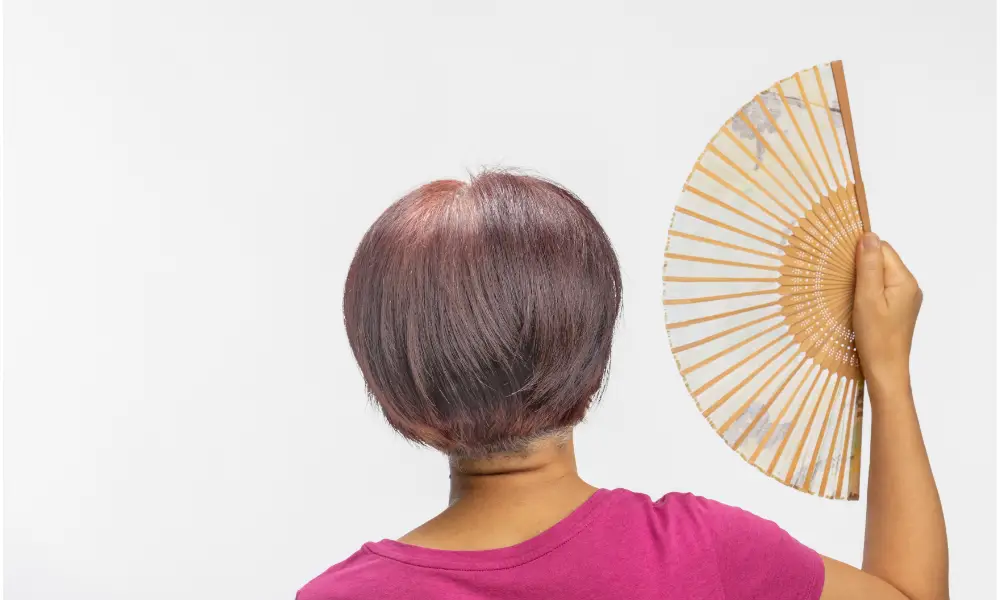Hot flashes are a common and often disruptive symptom, primarily associated with menopause. These sudden waves of intense heat, often accompanied by sweating and a flushed face, can significantly impact one’s quality of life. In this article, we will explore various home remedies that provide relief from hot flashes, offering a comprehensive approach to managing this natural but challenging phase.
Contents
What Causes Hot Flashes? 
Hot flashes during menopause are primarily caused by hormonal changes, particularly the decline in estrogen levels. Estrogen is a key reproductive hormone in women, and its fluctuations have a significant impact on the body’s thermoregulatory system. The specific mechanisms leading to hot flashes are not fully understood, but the following factors are believed to contribute to their occurrence:
- Estrogen Decline
The primary cause of hot flashes during menopause is the gradual decline in estrogen levels. As women approach menopause, the ovaries produce less estrogen and progesterone, leading to irregular menstrual cycles and eventually the cessation of menstruation.
- Impact on the Hypothalamus
The hypothalamus, a region in the brain that regulates body temperature, is highly sensitive to changes in estrogen levels. As estrogen decreases, the hypothalamus may become more sensitive and responsive to even small changes in body temperature, leading to the perception of overheating.
- Neurotransmitter Involvement
Changes in neurotransmitters, particularly serotonin, may contribute to the occurrence of hot flashes. Serotonin, a neurotransmitter that affects mood and temperature regulation, may be influenced by hormonal fluctuations during menopause.
- Vasodilation and Blood Flow Changes
Hot flashes involve the sudden dilation (widening) of blood vessels, especially those near the skin’s surface. This dilation increases blood flow to the skin, causing a sudden sensation of warmth and redness. The body responds by sweating to cool down.
- Hormonal Fluctuations
Rapid hormonal fluctuations, not just the overall decline in estrogen, are thought to trigger hot flashes. The body’s attempt to adapt to these changes can lead to the characteristic symptoms of sudden and intense heat.
- Genetic Factors
Genetic predisposition may play a role in determining an individual’s susceptibility to hot flashes. Women with a family history of early menopause or a higher prevalence of hot flashes among relatives may be more likely to experience them.
Home Remedies For Hot Flashes
While there is no cure for hot flashes, several home remedies may help alleviate their frequency and intensity. It’s important to note that individual responses can vary, and consulting with a healthcare professional is advisable. Here are some home remedies for managing hot flashes:
Cooling Techniques
Cooling Packs: Applying a cold pack or ice wrapped in a thin cloth to your neck or wrists can help cool your body and reduce the intensity of hot flashes.
Dressing in Layers
Wear lightweight, breathable clothing in layers. This allows you to adjust your clothing easily when a hot flash occurs.
Stay Hydrated
Drink plenty of water throughout the day. Staying hydrated helps regulate body temperature and may reduce the frequency of hot flashes.
Avoid Triggers
Identify and avoid triggers that may contribute to hot flashes, such as spicy foods, caffeine, alcohol, and hot beverages.
Maintain a Cool Environment
Keep your living and sleeping spaces cool. Use fans, open windows, or air conditioning to create a comfortable environment.
Regular Exercise
Engage in regular physical activity, such as walking or swimming, to promote overall health. Exercise can help regulate hormones and reduce the frequency of hot flashes.
Mind-Body Techniques
Deep Breathing: Practice slow, deep breathing exercises to help calm your body and manage stress, which can trigger hot flashes.
Yoga and Meditation: Incorporate yoga or meditation into your routine to promote relaxation and balance hormones.
Herbal Remedies
Black Cohosh: Some women find relief from hot flashes by taking black cohosh supplements. However, it’s essential to consult with a healthcare provider before using herbal remedies.
Soy Products: Foods rich in soy, such as tofu or soy milk, contain plant compounds that may help alleviate hot flashes for some women.
Acupuncture
Some women experience relief from hot flashes through acupuncture. Consult with a licensed acupuncturist to explore this option.
Lifestyle Changes
Quit Smoking: If you smoke, consider quitting, as smoking has been associated with increased hot flashes.
Maintain a Healthy Weight: Some women find that maintaining a healthy weight can help reduce the frequency of hot flashes.
Hormone Replacement Therapy (HRT)
For severe hot flashes, hormone replacement therapy (HRT) may be considered. This involves the use of estrogen or a combination of estrogen and progesterone under the guidance of a healthcare professional.
It’s important to discuss your symptoms with a healthcare provider before trying home remedies, especially if you have any underlying health conditions or are taking medications. They can provide personalized advice and help determine the most appropriate strategies for managing hot flashes during menopause.
Some Helpful Practical Tips For Managing Hot Flashes In Everyday Life 
Managing hot flashes in everyday life involves incorporating practical strategies and making adjustments to minimize their impact. Here are some practical tips for coping with hot flashes:
- Layered Clothing
Dress in layers so you can easily remove clothing during a hot flash. Choose breathable fabrics like cotton to help stay cool. - Portable Fan
Carry a small, portable fan with you to use when needed. Many battery-operated fans are discreet and can provide instant relief during a hot flash. - Cooling Products
Invest in cooling products such as cooling towels, neck wraps, or wristbands. These can be pre-cooled and worn or applied when a hot flash occurs. - Cooling Pillow
Use a cooling pillow or place a chilled pillowcase in the freezer for a short time before bedtime to help regulate body temperature during sleep. - Hydration
Keep a water bottle handy and stay well-hydrated throughout the day. Sipping cold water can help cool you down during a hot flash. - Desk Fan at Work
If possible, have a small desk fan at work to create a cooling breeze. Position it strategically to avoid disrupting colleagues. - Mindful Breathing
Practice deep, slow breathing when you feel a hot flash coming on. Inhale deeply through your nose, hold for a few seconds, and exhale slowly through your mouth. - Cooling Facial Mist
Carry a small spray bottle with water or a cooling facial mist. Spritz your face when you feel a hot flash approaching for instant relief.
Are Home Remedies As Effective As Medical Approaches for Hot Flashes?
The effectiveness of home remedies versus medical interventions for managing hot flashes during menopause can vary from person to person. It’s important to recognize that individual responses to treatments differ, and what works well for one person may not be as effective for another.
Conclusion
In conclusion, home remedies for hot flashes offer a diverse and holistic approach to managing this common symptom. From cooling strategies and herbal solutions to lifestyle adjustments and alternative therapies, individuals have a range of options to explore. It’s essential to remember that what works for one person may not work for another, so a personalized approach is key.
If you are facing menopause-related issues, menopause treatment at HerMantra can help. Book your free trial online menopause treatment session now.




